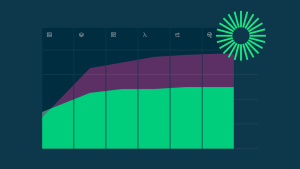While modern software applications are built to scale for nearly any workload or spike in traffic, the way you pay for monitoring them has been anything but modern.
Monthly commit pricing has triggered a tricky balancing act for organizations and teams trying to right-size monitoring bills. Use too little, and you’re wasting your budget on shelfware. Use too much, and you’re stuck with monthly overages—often at a significant premium as outlined by your friendly account collections team.
Not to mention the confusion of dealing with different prices and variable overage policies for each capability or data source. Application performance monitoring (APM) could run you one price, while infrastructure monitoring and log management are on a completely different scale. Add in serverless, real-user monitoring, synthetics, and more, and the complexity of paying for observability tooling puts you in a position where your teams are either limiting instrumentation to a subset of systems or dealing with unpredictable cost overruns.
To remove these complicating burdens, we recently launched a new, simplified pricing model for New Relic, including our perpetually free tier. In addition to our pay as you go option, we also rolled out our game-changing annual pool of funds option for engineering organizations looking for volume discounts, more predictability, advanced support, and identity management features.
And while we’ve generally detailed our new pricing structure before on this blog, we haven’t really had a chance to properly dig into our annual pool of funds option, which is what we’ll do in this post.
Unlike other commit pricing options throughout the monitoring landscape, this annual pool of funds approach gives you more flexibility to accommodate seasonal spikes and dips in usage. It’s simple. You work with a New Relic account team to estimate your data ingest volume based on your apps, systems, and the number of engineers who need full access to New Relic. You’re then free to use that pool of funds across the platform throughout your entire annual contract.
Read on to learn how our annual pool of funds differs from traditional commit pricing options available throughout the monitoring tooling landscape.
No monthly use-it-or-lose-it or overage surprises
With the New Relic annual pool of funds, you no longer have to worry about sending fewer metrics, events, logs, and traces from your apps and systems than you forecasted in a given month. While many monthly commit pricing options require you to fine-tune your monitoring usage to avoid under-utilization or costly overage penalties, our annual pool of funds option offers a more versatile approach to match the seasonality of your business.
If you underestimate your usage and use up your pool of funds before your contract year is up, you’re only billed at contracted rates. In contrast, many vendors charge a premium for any monthly or annual overages, effectively punishing customers for underestimating their needs.
Flexibility to match your business and monitoring needs
While cloud vendors have adapted to—and largely driven—shifts toward an event-driven architecture that makes it easier to scale up and down based on demand, monitoring pricing has not evolved accordingly. With static monthly commit options, you often risk paying for shelfware while instrumenting your environments and overpaying when dealing with the fluidity of spikes in traffic, seasonal or otherwise.
Similarly, with pricing barriers between monitoring capabilities like APM, infrastructure monitoring, and log management, you’re likely to either instrument a subset of your full stack to reduce costs or use multiple tools to get the full picture when troubleshooting an incident.
With our annual pool of funds option, there are no barriers between New Relic capabilities. You have the flexibility of an annual commitment to accommodate occasional spikes or dips in usage, plus the ability to use every capability across the platform throughout the year.
Significantly lower minimums to participate
While other similar annual commit options require six-figure contracts to participate, the New Relic annual pool of funds option starts at just a US$25K annual commitment, opening up the benefits to a much wider range of businesses than just large enterprises. And if you just want to get started with New Relic immediately or even take the platform for a test drive, we also offer a perpetually free tier with full access.
Simplified pricing metrics
Host-based and varied, expensive, ingestion-based pricing prevents your teams from instrumenting everything and promotes sampling rather than collecting all your operational data in one place. This approach also limits your teams from leveraging the newest innovations due to licensing barriers.
Conversely, instead of calculating pricing metrics across multiple products or capabilities, you can now access all of New Relic for the single, low price of US$ 0,40/GB for all of your telemetry data and rely on user-based pricing for your engineering teams to monitor and troubleshoot your apps and systems.
This approach provides a greater level of predictability and control over all of your monitoring costs. The best part? We’ve included access to the entire platform—APM, infrastructure monitoring, digital experience monitoring (browser, mobile, and synthetics), logs in context, serverless monitoring, and more—in every edition.
No more calculating varied monitoring costs or limiting instrumentation to avoid overages. In other words, you only pay for the value you’re receiving as you monitor, troubleshoot, and optimize your entire stack, all from one place.
Ready for observability at scale? Contact us today to learn more about our annual pool of funds option and get started.
As opiniões expressas neste blog são de responsabilidade do autor e não refletem necessariamente as opiniões da New Relic. Todas as soluções oferecidas pelo autor são específicas do ambiente e não fazem parte das soluções comerciais ou do suporte oferecido pela New Relic. Junte-se a nós exclusivamente no Explorers Hub ( discuss.newrelic.com ) para perguntas e suporte relacionados a esta postagem do blog. Este blog pode conter links para conteúdo de sites de terceiros. Ao fornecer esses links, a New Relic não adota, garante, aprova ou endossa as informações, visualizações ou produtos disponíveis em tais sites.



